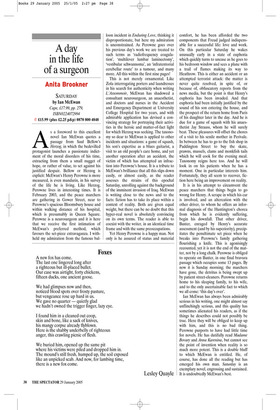A day in the life of a surgeon
Anita Brookner
SATURDAY by Ian McEwan Cape, £17.99, pp. 279, ISBN0224072994 ✆ £15.99 (plus £2.25 p&p) 0870 800 4848 As a foreword to this excellent novel Ian McEwan quotes a passage from Saul Bellow’s Herzog, in which the bedevilled protagonist launches a passionate indictment of the moral disorders of his time, extracting from them a small nugget of hope, or rather of value, to set against his justified despair. Bellow or Herzog is explicit: McEwan’s Henry Perowne is more measured, is even mandarin, in his survey of the life he is living. Like Herzog, Perowne lives in interesting times. It is February 2003, and the peace marchers are gathering in Gower Street, near to Perowne’s spacious Bloomsbury house and within walking distance of his hospital, which is presumably in Queen Square. Perowne is a neurosurgeon and it is here that we receive the first intimation of McEwan’s preferred method, which favours the set-piece extravaganza. I withheld my admiration from the famous bal loon incident in Enduring Love, thinking it disproportionate, but here my admiration is unconstrained. As Perowne goes over his previous day’s work we are treated to such terms as ‘radiofrequency coagulation’, ‘multilever lumbar laminectomy’, ‘vestibular schwannoma’, an ‘infratentorial cerebellar route’ to a tumour, and many more. All this within the first nine pages!
This is not merely ornamental. Like Zola interrogating porters and laundresses in his search for authenticity when writing L’Assommoir, McEwan has shadowed a consultant neurosurgeon, an anaesthetist, and doctors and nurses in the Accident and Emergency Department at University College Hospital for two years, and with admirable application has devised a convincing strategy for portraying their activities in the heroic and matter-of-fact light for which Herzog was seeking. The taxonomy so dear to McEwan is applied to other incidents and situations: a game of squash, his son’s expertise as a blues guitarist, a visit to an old people’s care home, and yet another operation after an accident, the victim of which has attempted an infraction into Perowne’s house. It is a tribute to McEwan’s brilliance that all this slips down easily, or almost easily, as the reader assesses the strains of this epochal Saturday, unrolling against the background of the imminent invasion of Iraq. McEwan is writing close to the news and to the facts: fiction has to take its place within a context of reality. Both are given equal weight, but there can be no doubt that this hyper-real novel is absolutely convincing on its own terms. The reader is able to coexist with the writer, in an identical time frame and with the same preoccupations.
Yet Henry Perowne is a happy man. Not only is he assured of status and material comfort, he has been afforded the two components that Freud judged indispensable for a successful life: love and work. On this particular Saturday he wakes unusually early in a state of euphoria which quickly turns to unease as he goes to his bedroom window and sees a plane with a trail of flames making its way to Heathrow. This is either an accident or an attempted terrorist attack: the matter is never quite resolved, in spite of, or because of, obfuscatory reports from the news media, but the point is that Henry’s euphoria has been invaded. And that euphoria had been initially justified by the sound of his son entering the house, and the prospect of the return home from Paris of his daughter later in the day. And he is due for a game of squash with his anaesthetist Jay Strauss, whom he will surely beat. These pleasures will offset the chores of a visit to his senile mother in Perivale. In between he has to go to the fish shop in Paddington Street to buy the skate, prawns, mussels, clams and monkfish tails which he will cook for the evening meal. Taxonomy reigns here too. And he will look in on his patients when he has a moment. One in particular interests him. Fortunately, they all seem to recover, fiction here being an improvement on reality.
It is in his attempt to circumvent the peace marchers that things begin to go wrong for Henry. A scrape in which his car is involved, and an altercation with the other driver, to whom he offers an informal diagnosis of the Huntington’s chorea from which he is evidently suffering, begin his downfall. That other driver, Baxter, enraged by Henry’s accurate assessment (and by his superiority), precipitates the penultimate set piece when he breaks into Perowne’s family gathering flourishing a knife. This is agonisingly recounted, yet it is not the end of the matter, not by a long chalk. Perowne is obliged to operate on Baxter, in one final bravura passage which occupies some 13 pages. By now it is Sunday morning; the marchers have gone, the detritus is being swept up by patient street-cleaners. Perowne returns home to his sleeping family, to his wife, and to the only ascertainable fact to which we all come: ‘this day’s over’.
Ian McEwan has always been admirably serious in his writing, one might almost say unflinchingly serious, and this quality has sometimes alienated his readers, as if the things he describes could not possibly be true. Here they will be obliged to keep up with him, and this is no bad thing. Perowne purports to have had little time for novels. He has dutifully read Madame Bovary and Anna Karenina, but cannot see the point of invention when reality is so much more potent. This is a double bluff to which McEwan is entitled. He, of course, has done all the reading but has emerged his own man. Saturday is an exemplary novel, engrossing and sustained. It is undoubtedly McEwan’s best.















































 Previous page
Previous page